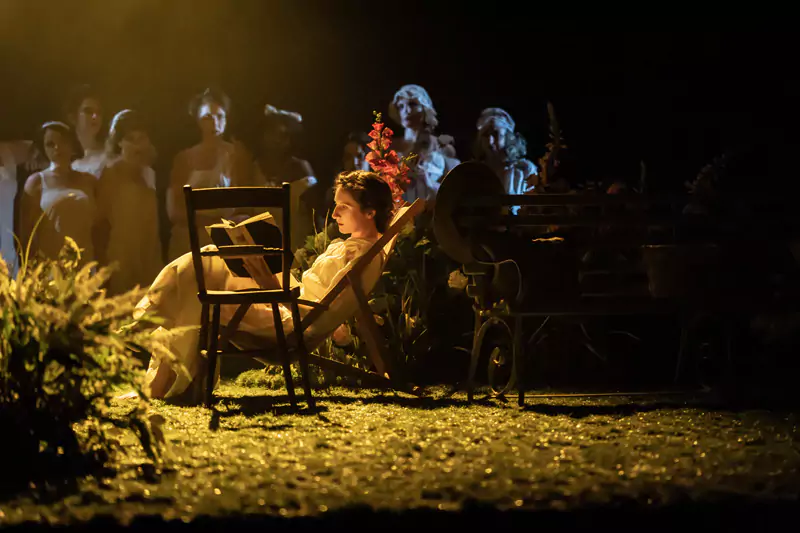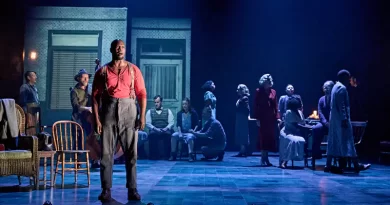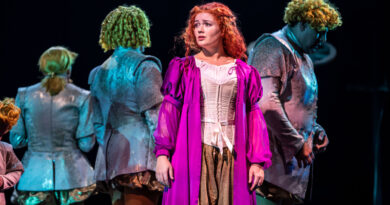“Mrs Warren’s Profession” at the Garrick Theatre
Jeremy Malies in the West End
27 May 2025
Everything in this production directed by Dominic Cooke (set and costumes by Chloe Lamford) is rooted in the late-Victorian era during which Bernard Shaw wrote the play. So does the interpretation leave the drama as a period piece set in aspic? No, of course not. The author’s prescience and social awareness mean that even if the prostitutes who form an eleven-strong mute chorus are clearly in Victorian or Edwardian costume (the play was banned by the Lord Chamberlain for seven years from 1893) we think forward to current sex-worker rackets and people-trafficking.

Bessie Carter as Vivie. Set by Chloe Lamford.
Photo credit: Johan Persson.
But does Cooke push sufficiently hard at this and find real parallels? I may have been the least perceptive person in the stalls, but for me the production spent much time stubbornly (and surprisingly) in its original setting.
This is a thoughtful treatment of the play that simply lacks flair. It might be a PR man’s dream to have real-life mother and daughter Imelda Staunton and Bessie Carter playing, respectively, successful former prostitute turned multinational brothel owner Kitty and her Cambridge-educated mathematician daughter Vivie. And yet there is no aggressive pushing of this in the publicity which is a relief.
Even with my low level of enthusiasm – and I was more engaged than many around me on a flat second press night – Staunton’s line “Am I your mother?” and Carter’s line much later, “I hardly know my mother …” made me cackle. And yet, this is unnecessary irony that distracts us from the basis of the plot. I interpret that basis to be Bernard Shaw taking issue with the fact that women and girls often have to sell their bodies because a free-market economy puts such low value on manual work that they cannot make a subsistence wage through conventional means.
Bernard Shaw’s other more subtle concern is to show how mother and daughter are similarly acquisitive and money-driven in different realms. Vivie even says that she should never have gone in for an undergraduate mathematics competition that offered such modest prize money. And while he wouldn’t have recognized the term, in having Kitty push Vivie through a Cambridge education, the author is portraying a tiger mother.
Carter (best known for Netflix’s Bridgerton) is convincing when Vivie says, “I like working and getting paid for it.” And she projects the character’s initial buttoned-up qualities successfully. In the second act, we see Vivie using her mathematics as an actuary in Chancery Lane. By contrast, Kitty earned her first wages on her back as a prostitute. But the author’s social campaigning should enthuse us when Kitty says that this was preferable to the fate of her sister who went to work in a white-lead factory expecting little more than mild paralysis of her fingers. Inevitably, her whole body was fatally poisoned. And yet, even the formidable Staunton – who recently won her fifth Olivier Award for Hello, Dolly! – fails to land this punch fully.
Imelda Staunton as Kitty.
Photo credit: Johan Persson.
This crucial line is in the second act. The play has been abridged to an hour and 45 minutes. I assume the filleting has been done by Cooke because I saw no programme credit for adaptor or dramaturg. Little is lost in characterization, but I should like to have been told more about Vivie’s time at Cambridge and there is some revealing detail in the original as written.
Technically, Staunton is impressive if not outstanding. Perhaps working with dialect coach Penny Dyer, she uses a diluted East End accent somewhere between Cockney sparrow and Received Pronunciation. There is not a hint of Estuary English – thankfully. Staunton is adept at showing her character’s self-knowledge. Thus, Kitty says she knows she would never pass for old money and a lady “in a cathedral town”. And I thought of a cathedral town, Chichester, which is only 20 miles from Haslemere where Bernard Shaw has set the play. I may have missed other major productions, but Chichester Festival Theatre comes to mind in terms of another revival.
In her almost tasteful liquorice-stripe dress, Staunton takes tiny tottering steps across Lamford’s two distinct set designs. We begin in a closely observed overgrown Haslemere garden with flower species that might indeed occur in the wild here. A huge ellipse sits low above the stage. The meaning eluded me, but lighting designer Jon Clark uses it as a canopy from which to create diffused shades of amber and ochre. It was as though the house lights were half-up and light was being shared between cast and those around me. This helped in terms of a collective experience when I was fully engaged but those moments were rare.
Kevin Doyle as Rev. Gardner is underwhelming. It’s a big ask but I’ve seen other actors do it; Doyle comes nowhere near suggesting that there might be an improbable backstory between his character and Kitty. He lacks the technical skill to conjure up chemistry, is flat throughout, and resorts to laboured comic gestures. As Sir George Crofts (wheeler-dealer and part owner of the international brothel empire) Robert Glenister hits the right egalitarian note with his verdict on Vivie: “We take her on her own merits. What does it matter who her father was?”
Of the male actors, only Sid Sagar as Praed truly impresses throughout. His character is an architect, though in the preface Bernard Shaw berates himself for not having written Praed as a theatre critic. I wonder what an Edwardian theatre critic would have made of this. Looking around Lamford’s second-act design, a grey minimalist London office involving only a few stark geometrical shapes, Sagar generates real ardour as his character implores Vivie (there is no romantic undertone) to come and explore the art galleries of Italy with him.
Cooke injects one line with new relevance. Praed tells Vivie, “You modern young ladies are splendid.” I don’t remember whether the chorus of prostitutes is on stage when he says it, but we think of them and, fleetingly, the production catches the enraged tone that Bernard Shaw would surely have wanted. The prostitutes are used to enormous effect when they dismantle much of the first-act set; it’s a means of stripping away many kinds of artifice.
It pains me to diss this production. There is nothing annoying, flamboyant, gimmicky, opaque, or mannered about it – Dominic Cooke is far too ethical for that. But the treatment never takes wing.










